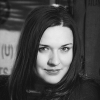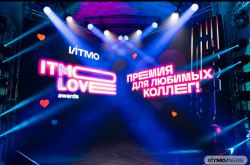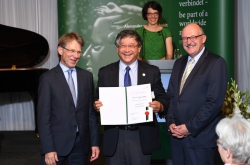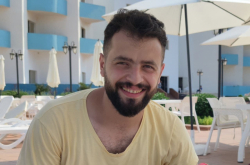You have numerous awards. How do you manage work on so many different projects?
The answer is very simple. I often recommend it to my students and generally advise everyone to choose a career in life that you will enjoy doing. Only this can guarantee you success. And you won’t mind devoting time to your beloved activities even during the weekends. Although I don’t recommend working over the weekends as a rule because one also needs rest and involvement in different kinds of activities.
What influenced you in choosing your life path?
I enjoyed doing theoretical work from school. I was the school champion of the Kaliningrad region in physics, mathematics and chemistry. I liked inventing new laws and coming up with new formulas. When I became the Head of the Department at the university, I became interested in the applied aspects of my work also. You know what they say: "There is nothing more practical than a good theory." It’s also very rewarding to witness how your fundamental research is applied in building actual machines, and even more - inventing commercial products.
Can you name some of the most resource-intensive and interesting projects? Are there scientific areas in which you are obviously more successful than in the others?
There were several such projects. I have been studying the phenomena of physics of substance interaction with a matter of optical radiation with extreme parameters. These can be extremely short duration waves or waves of very high or, on the contrary, very low intensity. Back in 1997, we have published a paper on optics of waves with a small number of oscillations with my colleague from the Kurchatov Institute and it became one of the key, widely quoted articles in physics of high-intensity radiation of extremely short duration. This is nonlinear optics of ultrashort pulses - and it is in this area that I achieved success and international recognition. Up till now my colleagues are using my review on the nonlinearity of the refractive index of impure dielectric media which I co-published in the Quantum Electronics journal in 1993. This work is still relevant today. We are currently developing a joint project with colleagues from the University of Hannover based on this research: we are developing a new project aimed at researching giant nonlinearities for new femtosecond photonics devices.

However, at the turn of the 21st century, I changed my attitude to what I was doing, I started questioning ways of practical application of my research. Who needs this optics of waves with a small number of oscillations? I’m sure, all scientists start asking such questions at a certain point. So, it turned out that the theoretical base developed by me and my colleagues perfectly suited creation of modern systems based on pulsed terahertz radiation, which could be applied for different purposes. And this field is still developing very actively. So, over the past month I got invited to speak at three different conferences.
So, you have accidentally found out that your fundamental developments can have a very practical implementation.
Yes, accidentally. We were engaged in doing fundamental research, which seemed to be of no use to anyone. But in theoretical studies, in fact, you can never guess in advance where exactly they would find practical application and whether they would find it at all. The difficulty also lies in the fact that it’s not easy to organize verification of theoretical predictions, especially in photonics: equipment costs a lot of money, and one can never be sure that the experiment will confirm the theory. Moreover, if one can’t predict anything theoretically, they are likely to just drop this topic altogether. Although, perhaps, they simply didn’t take into account certain factors that would become clear only during the experiment. Therefore, there is always uncertainty here, especially if the scientist is studying the physics of phenomena under extreme conditions.
What fields of photonics are most promising from the point of view of practical applications, in your opinion?

These are quantum communications, of course. We realized that this field would soon become important 12 years ago. Although we could have missed the trend - and all of it would have come to a standstill. Now ITMO already runs a small innovative enterprise Quantum Communications, which deals with quantum cryptography. The market for these developments is colossal. Just imagine that all these technologies of the "smart" city and the Internet of Things would work driven by certain sensors and autopilots - and all these systems would have to transmit information from one to another. Transmission channels would then, of course, need to be protected on the highest level. Otherwise, criminals would not need any physical strength to take control of a bus, for example: all they would need to do is hack its autopilot system. Significant funds have been allocated to this industry in recent years. However, the competition is steep, as well.
You know, no one believed what quantum optics could do for a long time. Even Einstein didn’t fully accept quantum optics theory. There have been many discussions on this subject in the 20th century. And now the theoretical analysis paradigm has shifted towards experimental research, which is carried out on expensive equipment - and helps researchers come up with commercial products. Another example of how theory can have brilliant practical applications.
What other theoretical studies in the field of photonics could possibly have good practical implementation potential?

First and foremost, theories which have a good implementation potential and thus can be introduced into actual industrial production quickly. My Department is now working very closely with ITMO’s School of Biotechnology and Cryogenic systems. We are trying do develop a technology which will enable effective food quality check. Imagine that you are buying a large batch of perishable products for your store, but how can you quickly check if all these products are actually fresh? This can be done simply by using terahertz radiation sources which I previously mentioned. And a similar technology is currently being developed for the detection of drugs and explosives.
Sure enough, photonics, and especially the diagnostic systems based on it, have a high potential for medical applications: namely, for detecting pathological changes in biological tissues. But the problem here is that from a commercial point of view it’s not always viable: any such project is usually very expensive and its development and implementation can take too long.
Could universities develop a strategy for coming up with a more practically-oriented research and development?
Such strategy exists and I’m actively promoting it. I think that ITMO should focus not only on retaining talented students, but also on creating small innovative enterprises that are initiated by these students. Quantum communications is a perfect example of such a SIE (Small Innovative Enterprise). When young people get the idea that they could not only do science research at the university, but develop a real product which has certain market value and open their own business, this motivates them to work much harder. And this helps build up the university’s profile and contributes to its image as a place for innovations.

You have been working with students for over 30 years. How has their attitude towards education and science evolved during this time?
I started lecturing in the Soviet times - and worked all the way through the 1990's and 2000’s. But I can’t say that the “quality” of students and their willingness to engage in science have changed greatly over time. Just as before, only about 10% of all students will do science research upon their graduation. And this is a normal figure: one can’t involve everyone in science. The remaining 90% of graduates are looking for building careers with successful companies in the industry, which is also quite natural.
And what do you think about adopting certain Western educational models and methods? For example, introducing educational modules... Or is it necessary to change everything from school? After all, many students don’t understand why they have to receive higher education at all and get thoroughly confused when facing the challenge of choosing disciplines for their studies and building their own educational modules?
Sure enough, not all students understand what they want to do with their lives in the West also. And we have to keep in mind several things here. The first thing is that the modular educational system is quite expensive: in terms of time and resources. After all, to make students understand what educational modules they need to build in order to prepare themselves for a certain professional career, they have to be taught and educated on all kinds of possibilities that there are. Secondly, if a certain professor’s course does not get chosen this academic year, their salary must still be retained and appropriate financial resources allocated to that. Therefore, in any case, any radical changes will prove ineffective. Everything should be done gradually. In addition to that, when former Bachelor’s students become Master’s students, they still get to choose their professional path by entering the training programs of their choice.

Does the educational process change to help former Bachelor’s students choose their professional path?
At our Department of Photonics and Optical Information Technologies students start working on actual projects in the labs since their second year. That means they don’t just study what is written in their textbooks, but get to realize and see with their own eyes what they need it for. Take linear algebra for example. While you are studying it, it’s not entirely clear what it is for. And once you get into a quantum computer science lab, you quickly realize that without this discipline you can not understand the very basics of the quantum computer science.
By doing so we give our students an opportunity to find their true calling. We had an interesting incident once at our Department. One straight-D student got expelled and then re-registered; but after we welcomed him back we gave him to work on another project. And there he could perfectly find his true calling. He is going to defend his thesis soon. It happens often: a person may think they are a theorist and be actively engaged in theoretical work, but then they try out experimental work and find out they have a clever pair of hands and were born to do it. And their priorities change. Therefore, sometimes it is important to try out different things, if you have doubt what you actually want in life. I’ll repeat myself again by saying: it's really important to do what you like in life.
What influenced you in your decision to become a university professor?
I think there was certain inertia involved in this: I wanted to do theoretical work and I could do it here, at the university.
In your 30-year-long career in the field of education, whom do you see yourself more: a teacher, a scientist or a founder of various scientific schools?

It all comes together here, actually. I think it's impossible to single out teaching. I like to give lectures and I made it to the top 300 Russian assistant professors ranking on the ISSEP classification ("Soros's assistant professor") back in the day. But it's pointless to lecture to those who don’t need it. Therefore, it’s really important to build a team of like-minded people at the department: and I mean not only its employees, but students also. Keeping this idea in mind, we created a new program of training at ITMO, one of its kind in Russia so far: "Photonics and Optoinformatics". It is much more effective and pleasant to work in a team of like-minded people, but sometimes one needs to create the necessary conditions themselves.
Was it hard for you to introduce managerial elements into your teaching work once you became the Head of your Department?
No, not at all. In the 1990’s I tried doing business, like many people did at the time. And my business dealt in selling potatoes, which were harvested at the local state farms. It was an interesting experience. And it became the defining moment for me because university work was discredited much in the 1990’s Russia. But I stayed at the university, because I liked doing theoretical physics. And I do not regret it at all.
And what is your most time-consuming activity now?
It’s still research work. Just recently, for example, I devoted 70% of my time for two weeks to the Russian-German project which aims at creating highly nonlinear materials for ultrafast elements of optical computers. Although there was a lot of paperwork on that project also. But I believe that a good leader is actually the one who can build their system’s work in such a way that it works just the same in their absence. The work at my Department is organized in such a way.
Do you have time for anything else in life rather than your beloved work?
I used to do sports a lot, now I’m much less active physically. But having done sports has influenced my character and personality. It helps me remember where and how I lost and won, analyze my own mistakes and never do the same mistakes again. And this is my modus operandi in life.





